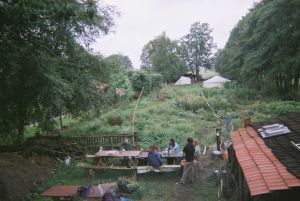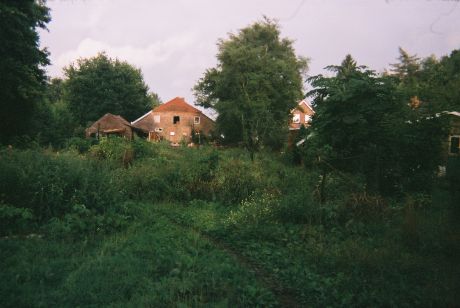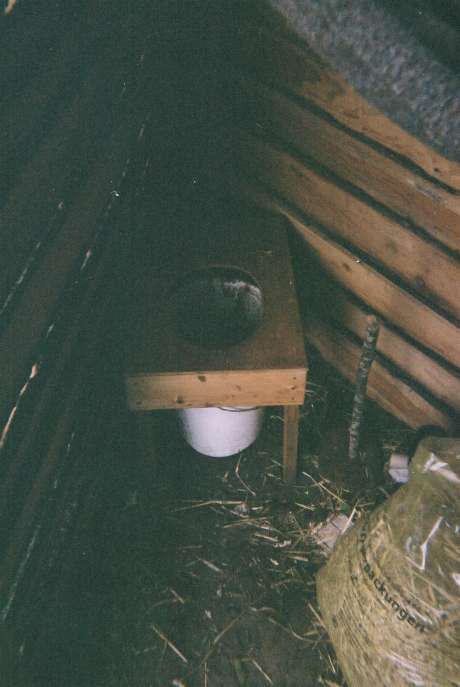A volunteering adventure
 international |
worker & community struggles and protests |
feature
international |
worker & community struggles and protests |
feature  Wednesday September 20, 2006 19:01
Wednesday September 20, 2006 19:01 by David Logan
by David Logan
Freezing in Ostfriesland
The purpose of this article is to describe my experience of an International Volunteer Project so that well-intentioned potential volunteers will have some idea of the kind of conditions they may face. Service Civil International (SCI), the organisation that promoted the project describes itself as: “an international non-governmental organisation committed to the promotion of peace and understanding through voluntary activities. These activities consist primarily of 2-3 week long international volunteer placements involving volunteers from all over the world. These projects range from working with marginalised people to ecological, arts and cultural projects, amongst others.” The Irish branch of Service Civil International is called Voluntary Service International (VSI).
In my job I get four weeks of annual leave each year. This year I decided to spend two of those weeks participating in an SCI International Volunteer Project. After perusing the project booklet and considering various options, I plumped for a project (or workcamp) called “Othala” in the village of Weenermoor in the North West of Germany, near the Dutch border.
The project, organised by the German branch of SCI, is described in the booklet as follows:
Weenermoor (near Leer/Ostfriesland)This brief description, supplied to VSI by the German branch, is all the information that the potential volunteer gets before applying. Application involves paying a €105 participation fee and making a commitment to participate fully not only in the project itself but also in the preparation and evaluation workshops run by VSI in Ireland. Therefore it is obviously very important that the description be accurate and honest. Unfortunately there were quite a few gaps and errors. First and foremost, Othala is not a farm. The property consists of a fairly dilapidated, partially refurbished farmhouse with a long but not very productive garden. The couple who own it (the founders) moved in in November 2005. There was no orchard. There was a plum tree growing in the neighbour's garden but the plums on it did not ripen during the two weeks of the camp. There was hardly any gardening work to do except to collect salad leaves from the garden, enough work for one person for less than one hour each day. Most of the working time was spent on the following projects: construction of a clay oven, construction of a solar food drier, cooking in the small, outdoor kitchen, replacing roof tiles of a shed and various works to the house including painting, ivy removal and mounting of insulation. Off the property, there was the opportunity for pairs of volunteers to work on two organic farms and in a health-food store.
Othala is a small farm project with a garden, an orchard and a Mongolian yurt (tent) founded as a place for experiencing a self-sustaining lifestyle. Othala invites volunteers to live as self-sustainable as possible and become conscious about how our normal life is organised and where food, energy and shelter come from. Vols will be involved in gardening (organic and herb garden, orchard), baking bread, renovation and reconstruction of the buildings with loam and straw, local contacts with other farms. Simple accom in tents, yurt or in the house on straw. Some knowledge of the skills may be useful. No alcohol.
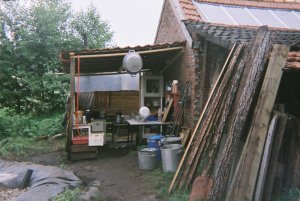 Washing facilities included two large enamel bowls filled from a jerry can or hosepipe or if you were really lucky, from a pot of warm water, heated on the same little woodstove that was used for cooking. Until sickness struck, the hosts requested that the bowl of water for hand-washing not be emptied after each person, so as to conserve water. The shower cubicle (pictured) was a makeshift arrangement of offcut timber boards and polythene sheeting. You stood on a pallet and hosed yourself down with cold water. Bracing! The toilets were a crude variety of compost-toilet. A wooden frame provided a seat over a plastic bucket. The urine and faeces were separated. You covered your faeces with two paper towels and then pressed down on it with a piece of wood. The paper towels were supposed to keep the flies away. They didn't. When the bucket was filled, faeces was dumped on a heap and covered with straw and leaves. The urine was emptied down the flush toilet in the house.
Washing facilities included two large enamel bowls filled from a jerry can or hosepipe or if you were really lucky, from a pot of warm water, heated on the same little woodstove that was used for cooking. Until sickness struck, the hosts requested that the bowl of water for hand-washing not be emptied after each person, so as to conserve water. The shower cubicle (pictured) was a makeshift arrangement of offcut timber boards and polythene sheeting. You stood on a pallet and hosed yourself down with cold water. Bracing! The toilets were a crude variety of compost-toilet. A wooden frame provided a seat over a plastic bucket. The urine and faeces were separated. You covered your faeces with two paper towels and then pressed down on it with a piece of wood. The paper towels were supposed to keep the flies away. They didn't. When the bucket was filled, faeces was dumped on a heap and covered with straw and leaves. The urine was emptied down the flush toilet in the house.My understanding is that SCI projects work on the basis of an exchange. You pay a participation fee and work for a few hours per day and in return you are provided with food and accommodation as well as the opportunity to meet like-minded people from all over the world. While I was prepared for the fact that I would be sleeping in a tent for the two weeks, nothing prepared me for the food situation, not even the preparation workshop run by VSI in Dublin. In the camp information sheet, which I received two months after sending in my application fee, it was mentioned that the food would be vegan (no meat, fish, eggs, dairy, honey or any other animal products). This did not perturb me as I eat a mainly vegetarian diet and know that I could live on vegan food for two weeks. What did perturb me when I arrived at Othala was discovering that most of the fruit and vegetables that we would be eating would be coming from the waste container of two local supermarkets. Granted, some of it was in reasonable condition. Very ripe, but edible. Some of it was not in a reasonable condition, i.e. mouldy or starting to decay. Never mind. It went into the soup anyway. On one occasion, a young volunteer cut the mouldy bit off a tomato only to hear one of the hosts tell her to use it. In fairness to the volunteers who worked in the kitchen, I have to say that the taste of the dishes served usually belied the very humble origin of the ingredients. My concern, however, related not to the taste but to the safety and nutritional quality of the food, a point that seemed to be lost on some people when I raised the issue, including certain of the camp hosts and leaders. Whether that misunderstanding was deliberate or not I do not know but they did understand English well.
Oh, well, never mind the fruit and veg. At least we had those great vegan standbys, peanut butter and tahini (sesame seed paste). Or did we? Well, yes, in limited quantities. We were actually asked to spread them thinly and warned that they might run out! What particularly annoyed me was that peanut butter and tahini are about half the price over there that they are here in Ireland.
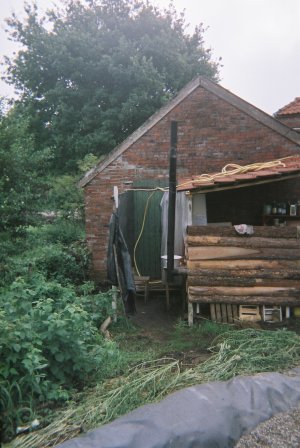 The fact that this year is the first year that a work camp was hosted in Othala goes some way towards explaining the practical difficulties we encountered. However, I would have to say that in my opinion, the hosts were idealistic to the point of irresponsibility. The bread situation illustrates this amply. A certain number of loaves of (organic) bread had been purchased by the hosts. The bread that was to feed us during the latter part of the camp was to be made out of flour that had yet to be milled and baked in a clay oven that had yet to be built. The grains had been purchased and were milled into flour on the first Monday of the camp. This was actually very interesting. All fourteen of us, hosts, leaders and volunteers, got on our bikes and cycled to the windmill in a nearby town. The bags of grain were taken on a bicycle trailer. We got a tour of the mill, given by the miller and then we watched as the grain was ground between rotating millstones. The miller mentioned that as time had passed, his mill was being used less and less. It is now used regularly by only one farmer, who gets grain milled to feed his livestock. So it had been some time since the mill was used to make flour for human consumption. The following week, we found out why. Sandy bread. In order to make flour fine enough to make bread, the millstones had to be moved closer together and the grain had to be passed through twice. So tiny particles of millstone ended up in the bread. A great source of minerals, I'm sure, but not pleasant to eat. I found it strange how none of the hosts or leaders noticed it until I mentioned it. Group dynamics, perhaps. The clay oven mentioned above didn't get finished due to inclement weather. At least we had fun standing in troughs of mud, mixing the clay and sand with our feet. Luckily nobody was cut by the large shard of glass that appeared in the mixture one day! In the end, an alternative source of bread was found. A local baker agreed give us bread which had not been sold. There was some debate about whether or not we should actually accept this offer (as the bread wasn't organic) but common sense prevailed in the end.
The fact that this year is the first year that a work camp was hosted in Othala goes some way towards explaining the practical difficulties we encountered. However, I would have to say that in my opinion, the hosts were idealistic to the point of irresponsibility. The bread situation illustrates this amply. A certain number of loaves of (organic) bread had been purchased by the hosts. The bread that was to feed us during the latter part of the camp was to be made out of flour that had yet to be milled and baked in a clay oven that had yet to be built. The grains had been purchased and were milled into flour on the first Monday of the camp. This was actually very interesting. All fourteen of us, hosts, leaders and volunteers, got on our bikes and cycled to the windmill in a nearby town. The bags of grain were taken on a bicycle trailer. We got a tour of the mill, given by the miller and then we watched as the grain was ground between rotating millstones. The miller mentioned that as time had passed, his mill was being used less and less. It is now used regularly by only one farmer, who gets grain milled to feed his livestock. So it had been some time since the mill was used to make flour for human consumption. The following week, we found out why. Sandy bread. In order to make flour fine enough to make bread, the millstones had to be moved closer together and the grain had to be passed through twice. So tiny particles of millstone ended up in the bread. A great source of minerals, I'm sure, but not pleasant to eat. I found it strange how none of the hosts or leaders noticed it until I mentioned it. Group dynamics, perhaps. The clay oven mentioned above didn't get finished due to inclement weather. At least we had fun standing in troughs of mud, mixing the clay and sand with our feet. Luckily nobody was cut by the large shard of glass that appeared in the mixture one day! In the end, an alternative source of bread was found. A local baker agreed give us bread which had not been sold. There was some debate about whether or not we should actually accept this offer (as the bread wasn't organic) but common sense prevailed in the end.It will come as no surprise to readers that everyone suffered some kind of digestive ailment, particularly during the second week. The combination of poor sanitation, nutritional deficiencies and tiredness proved too much for our guts. Suffice to say that the lucky ones only had frequent trips to the toilet. After having called a doctor for advice, the hosts reminded us of the importance of washing our hands and told us to use clean water each time we did. Apparently he had also told them that this kind of situation is normal!
So why didn't I just leave? An excellent question and one that I asked myself more than once. One of the successes of the camp was that the group of volunteers from the USA, England, Germany, Italy, Japan, Tajikistan, Sweden, Switzerland and Ireland got along very well together, in spite of the fact that not everyone had a great command of English. I felt that I didn't want to leave early because I didn't want to leave the group. I also wanted to see if things would improve as time went on. Another thing that helped me stay the distance was the plan I had to write this article – it gave me a kind of detached curiosity about my own situation without which I would have felt less calm than I did. And in spite of all that I have written above, there were days that I really enjoyed. I was one of the few volunteers who had the opportunity to work on a real farm in the area. I spend the two days packing potatoes or working on top of a potato harvester. The farmer and his family were friendly and we chatted during lunch and tea breaks. The lunches were excellent and we left with a bag of spuds each. We were also taken as passengers in the machinery so we could watch the farmer and an apprentice harvest wheat, which was a new experience for both of us. The pair of volunteers who worked on the other farm were also well looked after and brought out sight-seeing during the week-end. During that week-end I joined a small group who made a day-trip to the Dutch city of Groningen. The weather was beautiful. We wandered around, slept in the sun, bought postcards and ate in restaurants. The following day I cycled to the nearby town of Weener with another volunteer. We explored along the canal and had dinner in a Thai restaurant. It was a nice restaurant but they didn't cook pad-thai, which is a bit unusual.
There were educational workshops run by friends of the hosts every day during the first week including felt-making, which I enjoyed. There was also an enlightening talk about money, covering Local Exchange Trading Systems and the effect that the charging of interest has in an economy. During the last three days at the camp things improved. We had enough bread and peanut butter. One of the hosts, a musician, played music and we had a sing-song in the yurt on a couple of nights. There were some spontaneous drumming sessions. But I was still relieved when it was over. I suspect that the hosts were too.
